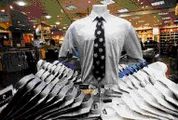Source:

BUSINESS DAY TV: Massmart battens down the hatches
by Transcript Service,
2016-02-26 14:51:06.0
HANS van Lierop is Massmart’s chief financial officer.
BUSINESS DAY TV: Massmart says the environment for consumers is likely to get tougher, with sales of hi-tech goods and appliances likely to come under pressure. Out with results today, reporting an 8.8% rise in sales for 2015 but headline earnings were up by a more muted 1.2% as it was hit by currency volatility and a higher interest bill. Joining us on News Leader with more detail is chief financial officer Hans van Lierop.
Hans, so shares (are) reacting positively today to those numbers, so far at least, and when the trading update came out recently there was a negative reaction. Do you think getting the detail of the numbers, and what’s behind those numbers, has helped to ease some of the concerns of investors?
HANS VAN LIEROP: It certainly helps for investors to understand the detail…. Trading early in the day is always a little bit influenced by low volumes and therefore the volatility in the share price is a little bit higher. We are very pleased to see that investors have appreciated our strong results, which, particularly before forex, are in the double-digit territory….
BDTV: Still you are getting increasingly concerned about the deteriorating South African economy. You’ve cut your full-year dividend by 39%. To what extent do we read that as part of a signal as to just how tough you see things becoming, moving forward?
HVL: Yes, we need to separate two issues here. The economic outlook versus the dividend policies, if you allow me. We are not the only ones flagging that the economy is in a tough environment, that growth will be muted, and that prices are on the increase and consumers will feel the impact in their disposable income. So in that sense I think we need to be moderate in our expectations…. The reduction in dividend is not directly related to that … (it) is more related to (the fact) that we have been extremely rich in dividend over the years. We were well ahead of our industry peers, we’ve been buying significant amounts of real estate. We want to continue to have the cash flow and the opportunity to capitalise on opportunities, particularly when we go into Africa, and in that sense it’s prudent to align the dividend policy with the industry peers, and that’s what we’ve been doing.
BDTV: So yes, you’ve raised your dividend cover to two times, which you say is in line with those peers. You’ve also geared up to buy some of that property between 2012 and 2014 and that’s raised your interest bill … gearing is up to 54.6%. With the reduced dividend would you have the opportunity to bring your gearing back down or are you comfortable with it there … will you be making more property acquisitions?
HVL: Yes, we absolutely believe that from here we will be bringing that gearing down. We’re going into a period where capex returns to about 1.6%-1.9% of sales, which are the historic levels that Massmart has had in the past, so that will reduce the dividend and will definitely help. We improved on working capital this year and we intend to continue to do that, which will all help towards the contribution of deleveraging the balance sheet and reduce interest in the P and L.
BDTV: Let’s take a look at operations in SA right now. It is, as you say, becoming an increasingly tough market to operate in. You’re dealing with a very constrained consumer and from here on out you’ve got a food price scenario to contend with, on the one hand. You’ve got a weaker rand to contend with as well. Talk us through the kind of impact that’s going to start having on your margins specifically, if any … how much pricing power you hold at this stage.
HVL: Thank you for asking that … the pricing power for us is a big debate and upward pressure on prices, be it in food or in other segments, will undoubtedly impact the consumer. As you’ve seen this year, we have been holding margins relatively stable. Our improvement in margin of 30 basis points is mostly coming from mix and we will continue to maintain that level of margin and price…. But what is important for us is that we create great deals so we can continue to offer value to our customers. We do that through our relative clout, our negotiation skills with suppliers, in collaboration with suppliers, but also perhaps offering more private label, smaller pack sizes, and being in store with the right quality at the moment when people are receiving their money so that they can get that value offering at that point in time. Overall that should still maintain our margin but should offer opportunity for consumers to benefit while they face some of the bigger challenges.
BDTV: The budget yesterday — I think there were a few expectations particularly in the personal income tax side but there was also some expectation that we could see an increase in VAT, which we haven’t seen. So the minister has gone quite some way in helping keep the pain rather than increasing the pain (for) consumers. Was it a relief to you? What did you read into the budget?
HVL: Yes, I need to do a little bit more work on defining the exact impact of that budget. But we are obviously relieved to see that social grants are going up because they have not been following the base of inflation, and we are also relieved to see that there’s going to be a fund of about R5.5bn that is going to relieve some of the pain (for) the most vulnerable in society — and obviously that will give them opportunity to get value for money in the stuff that we offer to them.
BDTV: Looking at your stable … Makro, Game, Builders Warehouse, Cambridge Foods as well — is Builders still boasting the most resilience right now? Because you’ve noted that things have started to wane on that end as well.
HVL: The second half was a little bit tougher than the first half and we should have shown that that would continue. On Builders more specifically we had a few specific trends going on. We had the contractor business, particularly towards government, being a little bit slower. We were sorting out some procedural issues with government on some payments, which slowed our activity, but that has in the meantime been sorted out. And if you go back to our results from a year ago we would have mentioned that our sales were up 1%, from generator sales as a consequence of the load shedding environment, and since that has improved obviously we see generator sales being a little bit lower. So we have seen that reduction in the second half but the commissioning around house building has been at the same level and we expect our order book for the first half to be very robust.
BDTV: And how prepared are you for the lean times that lie ahead this year?
HVL: Any good business in these times will batten down the hatches, will look at cost control, will restructure and make sure that they are well organised. We will keep on taking care of our staff, (who) will be impacted by the tough environment as well in terms of their families and their environment immediately … and hope to come out stronger at the other side of the cycle.
HANS van Lierop is Massmart’s chief financial officer.
BUSINESS DAY TV: Massmart says the environment for consumers is likely to get tougher, with sales of hi-tech goods and appliances likely to come under pressure. Out with results today, reporting an 8.8% rise in sales for 2015 but headline earnings were up by a more muted 1.2% as it was hit by currency volatility and a higher interest bill. Joining us on News Leader with more detail is chief financial officer Hans van Lierop.
Hans, so shares (are) reacting positively today to those numbers, so far at least, and when the trading update came out recently there was a negative reaction. Do you think getting the detail of the numbers, and what’s behind those numbers, has helped to ease some of the concerns of investors?
HANS VAN LIEROP: It certainly helps for investors to understand the detail…. Trading early in the day is always a little bit influenced by low volumes and therefore the volatility in the share price is a little bit higher. We are very pleased to see that investors have appreciated our strong results, which, particularly before forex, are in the double-digit territory….
BDTV: Still you are getting increasingly concerned about the deteriorating South African economy. You’ve cut your full-year dividend by 39%. To what extent do we read that as part of a signal as to just how tough you see things becoming, moving forward?
HVL: Yes, we need to separate two issues here. The economic outlook versus the dividend policies, if you allow me. We are not the only ones flagging that the economy is in a tough environment, that growth will be muted, and that prices are on the increase and consumers will feel the impact in their disposable income. So in that sense I think we need to be moderate in our expectations…. The reduction in dividend is not directly related to that … (it) is more related to (the fact) that we have been extremely rich in dividend over the years. We were well ahead of our industry peers, we’ve been buying significant amounts of real estate. We want to continue to have the cash flow and the opportunity to capitalise on opportunities, particularly when we go into Africa, and in that sense it’s prudent to align the dividend policy with the industry peers, and that’s what we’ve been doing.
BDTV: So yes, you’ve raised your dividend cover to two times, which you say is in line with those peers. You’ve also geared up to buy some of that property between 2012 and 2014 and that’s raised your interest bill … gearing is up to 54.6%. With the reduced dividend would you have the opportunity to bring your gearing back down or are you comfortable with it there … will you be making more property acquisitions?
HVL: Yes, we absolutely believe that from here we will be bringing that gearing down. We’re going into a period where capex returns to about 1.6%-1.9% of sales, which are the historic levels that Massmart has had in the past, so that will reduce the dividend and will definitely help. We improved on working capital this year and we intend to continue to do that, which will all help towards the contribution of deleveraging the balance sheet and reduce interest in the P and L.
BDTV: Let’s take a look at operations in SA right now. It is, as you say, becoming an increasingly tough market to operate in. You’re dealing with a very constrained consumer and from here on out you’ve got a food price scenario to contend with, on the one hand. You’ve got a weaker rand to contend with as well. Talk us through the kind of impact that’s going to start having on your margins specifically, if any … how much pricing power you hold at this stage.
HVL: Thank you for asking that … the pricing power for us is a big debate and upward pressure on prices, be it in food or in other segments, will undoubtedly impact the consumer. As you’ve seen this year, we have been holding margins relatively stable. Our improvement in margin of 30 basis points is mostly coming from mix and we will continue to maintain that level of margin and price…. But what is important for us is that we create great deals so we can continue to offer value to our customers. We do that through our relative clout, our negotiation skills with suppliers, in collaboration with suppliers, but also perhaps offering more private label, smaller pack sizes, and being in store with the right quality at the moment when people are receiving their money so that they can get that value offering at that point in time. Overall that should still maintain our margin but should offer opportunity for consumers to benefit while they face some of the bigger challenges.
BDTV: The budget yesterday — I think there were a few expectations particularly in the personal income tax side but there was also some expectation that we could see an increase in VAT, which we haven’t seen. So the minister has gone quite some way in helping keep the pain rather than increasing the pain (for) consumers. Was it a relief to you? What did you read into the budget?
HVL: Yes, I need to do a little bit more work on defining the exact impact of that budget. But we are obviously relieved to see that social grants are going up because they have not been following the base of inflation, and we are also relieved to see that there’s going to be a fund of about R5.5bn that is going to relieve some of the pain (for) the most vulnerable in society — and obviously that will give them opportunity to get value for money in the stuff that we offer to them.
BDTV: Looking at your stable … Makro, Game, Builders Warehouse, Cambridge Foods as well — is Builders still boasting the most resilience right now? Because you’ve noted that things have started to wane on that end as well.
HVL: The second half was a little bit tougher than the first half and we should have shown that that would continue. On Builders more specifically we had a few specific trends going on. We had the contractor business, particularly towards government, being a little bit slower. We were sorting out some procedural issues with government on some payments, which slowed our activity, but that has in the meantime been sorted out. And if you go back to our results from a year ago we would have mentioned that our sales were up 1%, from generator sales as a consequence of the load shedding environment, and since that has improved obviously we see generator sales being a little bit lower. So we have seen that reduction in the second half but the commissioning around house building has been at the same level and we expect our order book for the first half to be very robust.
BDTV: And how prepared are you for the lean times that lie ahead this year?
HVL: Any good business in these times will batten down the hatches, will look at cost control, will restructure and make sure that they are well organised. We will keep on taking care of our staff, (who) will be impacted by the tough environment as well in terms of their families and their environment immediately … and hope to come out stronger at the other side of the cycle.




















Login OR Join up TO COMMENT